Margo Kelly's Blog, page 47
April 3, 2014
C is for Conferences

So … you want to be a writer? Where do you start? How do you get there? No worries. This month I’ll be sharing my A to Z list of writer’s resources: books, blogs, and beyond! Check back each day to find helpful resources for improving your writing and navigating your way through the publishing industry.
C is for Conferences
Writers' conferences are a huge resource for information, networking, and pitching. Agents, editors, publishers, and fellow writers attend these conferences to teach and learn from each other. The first conference you attend is likely to be quite overwhelming (it was for me), but I also learned a lot, got my hopes up a lot, and made friends a lot. Chances are, there's a great local conference near you.
Simply go to Google, type in your state, writer conference, and see what pops up on your screen.
You can also visit:
Writers Digest List of Conferences
SCBWI Annual Conferences
Poets & Writers Conferences
2014 Writers Conferences
And if you think you're too much of an introvert to ever attend such a public event, then WriteOnCon is for you!! This is an awesome writers' online conference: WriteOnCon
Have you ever attended a conference - - or want to attend a conference? Which one?
Published on April 03, 2014 03:00
April 2, 2014
B is for BROWNE & KING
 So … you want to be a writer? Where do you start? How do you get there? No worries. This month I’ll be sharing my A to Z list of writer’s resources: books, blogs, and beyond! Check back each day to find helpful resources for improving your writing and navigating your way through the publishing industry.
So … you want to be a writer? Where do you start? How do you get there? No worries. This month I’ll be sharing my A to Z list of writer’s resources: books, blogs, and beyond! Check back each day to find helpful resources for improving your writing and navigating your way through the publishing industry.The letter B is for BROWNE & KING
If you're a writer, you'll need editorial skills, too, because whether you choose the traditional path of publishing or you choose to self-publish, you will need to polish your manuscript and make it shine! Editing your own work is essential, and Renni Browne and Dave King have put together a must-have book to guide you through the process:
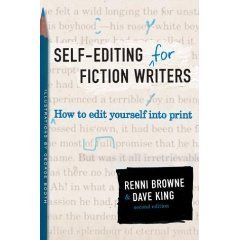
Do you have a favorite book on the craft of writing?
Published on April 02, 2014 04:00
Insecure Writer's Support Group
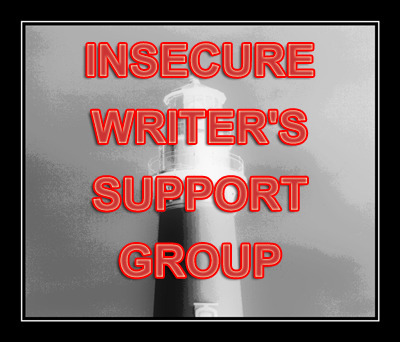 The first Wednesday of every month is officially Insecure Writer’s Support Group day. Click here for more information about the group. Post your thoughts on your own blog.Share and Encourage.Writers can express doubts and concerns without fear of appearing foolish or weak.Those who have been through the fire can offer assistance and guidance. It’s a safe haven for insecure writers of all kinds! I highly encourage you to check them out today and join the group. Do you belong to a writer's group?How has it helped you?
The first Wednesday of every month is officially Insecure Writer’s Support Group day. Click here for more information about the group. Post your thoughts on your own blog.Share and Encourage.Writers can express doubts and concerns without fear of appearing foolish or weak.Those who have been through the fire can offer assistance and guidance. It’s a safe haven for insecure writers of all kinds! I highly encourage you to check them out today and join the group. Do you belong to a writer's group?How has it helped you?
Published on April 02, 2014 02:30
April 1, 2014
A to Z Challenge
Well, here we go again. It's another year, another April, which means one thing:another A to Z Challenge!
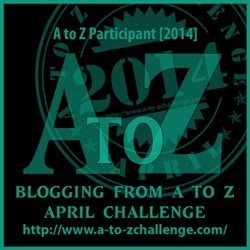 http://www.a-to-zchallenge.com/p/a-to-z-challenge-sign-uplist-2014.html
What is it you ask?
"The brainchild of Arlee Bird, at Tossing it Out, the A to Z Challenge is posting every day in April except Sundays (we get those off for good behavior.) And since there are 26 days, that matches the 26 letters of the alphabet. On April 1, blog about something that begins with the letter “A.” April 2 is “B,” April 3 is “C,” and so on. You can use a theme for the month or go random – just as long as it matches the letter of the alphabet for the day." Click here for complete details! So for the entire month of April, I will be focusing on a specific topic of information to share with you ... about writing! (surprise, surprise, surprise!)
http://www.a-to-zchallenge.com/p/a-to-z-challenge-sign-uplist-2014.html
What is it you ask?
"The brainchild of Arlee Bird, at Tossing it Out, the A to Z Challenge is posting every day in April except Sundays (we get those off for good behavior.) And since there are 26 days, that matches the 26 letters of the alphabet. On April 1, blog about something that begins with the letter “A.” April 2 is “B,” April 3 is “C,” and so on. You can use a theme for the month or go random – just as long as it matches the letter of the alphabet for the day." Click here for complete details! So for the entire month of April, I will be focusing on a specific topic of information to share with you ... about writing! (surprise, surprise, surprise!)
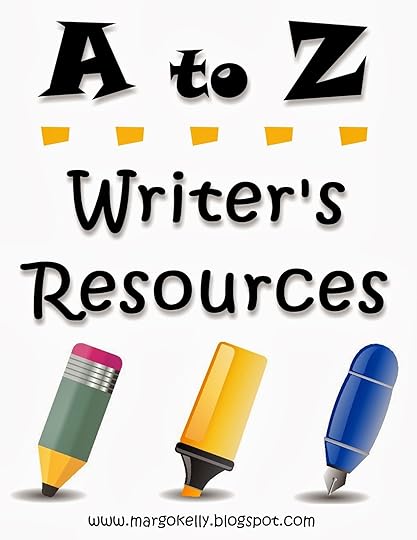
So … you want to be a writer? Where do you start? How do you get there? No worries. This month I’ll be sharing my A to Z list of writer’s resources: books, blogs, and beyond! Check back each day to find helpful resources for improving your writing and navigating your way through the publishing industry. The letter A is for AGENTS If you're pursuing the traditional path of publishing, you may be looking for an agent, but do you want just any agent? How do you know that he or she will be reliable, honest, and ethical? Start here: Association of Authors’ Representatives http://www.aaronline.org/ The AAR is a professional organization of hundreds of agents that work with book authors and playwrights. They hold their members to the highest standards of ethics. The website offers a wealth of information and insight into the industry. ...I'll see YOU back here tomorrow for the letter B.... In the meantime, are you participating in the A to Z Challenge? If so, do you have a theme for your posts this month?
 http://www.a-to-zchallenge.com/p/a-to-z-challenge-sign-uplist-2014.html
What is it you ask?
"The brainchild of Arlee Bird, at Tossing it Out, the A to Z Challenge is posting every day in April except Sundays (we get those off for good behavior.) And since there are 26 days, that matches the 26 letters of the alphabet. On April 1, blog about something that begins with the letter “A.” April 2 is “B,” April 3 is “C,” and so on. You can use a theme for the month or go random – just as long as it matches the letter of the alphabet for the day." Click here for complete details! So for the entire month of April, I will be focusing on a specific topic of information to share with you ... about writing! (surprise, surprise, surprise!)
http://www.a-to-zchallenge.com/p/a-to-z-challenge-sign-uplist-2014.html
What is it you ask?
"The brainchild of Arlee Bird, at Tossing it Out, the A to Z Challenge is posting every day in April except Sundays (we get those off for good behavior.) And since there are 26 days, that matches the 26 letters of the alphabet. On April 1, blog about something that begins with the letter “A.” April 2 is “B,” April 3 is “C,” and so on. You can use a theme for the month or go random – just as long as it matches the letter of the alphabet for the day." Click here for complete details! So for the entire month of April, I will be focusing on a specific topic of information to share with you ... about writing! (surprise, surprise, surprise!)

So … you want to be a writer? Where do you start? How do you get there? No worries. This month I’ll be sharing my A to Z list of writer’s resources: books, blogs, and beyond! Check back each day to find helpful resources for improving your writing and navigating your way through the publishing industry. The letter A is for AGENTS If you're pursuing the traditional path of publishing, you may be looking for an agent, but do you want just any agent? How do you know that he or she will be reliable, honest, and ethical? Start here: Association of Authors’ Representatives http://www.aaronline.org/ The AAR is a professional organization of hundreds of agents that work with book authors and playwrights. They hold their members to the highest standards of ethics. The website offers a wealth of information and insight into the industry. ...I'll see YOU back here tomorrow for the letter B.... In the meantime, are you participating in the A to Z Challenge? If so, do you have a theme for your posts this month?
Published on April 01, 2014 03:00
March 28, 2014
Book Review: MONDAY, MONDAY
 Monday, Monday: A Novel by Elizabeth Crook
Monday, Monday: A Novel by Elizabeth CrookMy rating: 4 of 5 stars
Such a compelling novel! Books like this make me wish I was still in a book club, because this story needs to be discussed with fellow readers!
The main topic I'd like to discuss: Does grief give you the right to behave any way you want? Say and do anything you want? Really?
This book is very much about how various people cope with the grief encountered in life ... succumbing to it, regretting it, muddling through it, and finally overcoming it. We all handle it differently. Do we have any right to judge others and the way they handle it?
For example, Crook writes:
""Look what I've done," he said. "You trusted me, and look what I've done." He had come to her aid, and then he had wrecked her life."
- and -
""I don't want to live my whole life knowing that my fears might come true, and just hoping for them not to." Shelly didn't answer for a moment before saying, "But that's what most of us do. And if they do come true, we survive and then walk down the middle of whatever road we choose then.""
But don't worry!!
This book isn't only about grief, it is also very much about LOVE: the types of love we allow ourselves to receive from others, the types of love we allow ourselves to give to others, and the type of love that sustains us and moves us to better lives.
Elizabeth Crook's writing is beautiful, and she has an amazing ability to paint the scene and show the reader the action. The beginning and the ending sections of this book were by far my favorites. The middle slowed quite a bit in some places with a lot of "telling" rather than "showing" scenes. However, to cover the spans of time in this multi-generational book, I'm not quite sure how Crook could have accomplished it otherwise. Also in the middle there seemed to be some scenes that felt like "fillers" to me. Again, this is something I'd like to discuss with a book club (if only I was in one! ha). I'd like to ask if they thought the scenes were relevant to the plot or not. And frankly, the muddle in the middle is the only reason I knocked this book's rating from five stars to four stars. Everything else was great. Crook even made me cry multiple times!
This is a story that will linger in my mind for a while.
There is sexuality and violence in this book, but nothing mind-shattering. The language is very clean; I can only recall a couple of cuss words. Definitely a book I'd let my mother read. *wink* Oh, and then I'd have someone to discuss it with! Very good idea.
View all my reviews
Published on March 28, 2014 20:11
March 21, 2014
My Writing Process Blog Tour
Kat Ross, (who can be found at: www.katrossbooks.com) author of the super cool book,
SOME FINE DAY
, invited me to participate in the:
"My Writing Process Blog Tour."
Yay me! *wink*
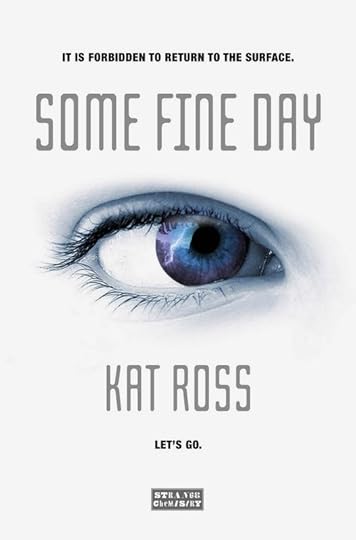
The blog tour includes wonderful authors who explain their writing processes. So be sure to check out the blog link above and the three below. And in the meantime, I will attempt to explain my own process. YIKES.
The questions:
1) What am I working on?
I'm currently working on two projects ... at the same time ... which is nuts. In the past I've only worked on one project at a time, but when I tried to decide what story to write next, there were two ideas that just would not leave me alone. And as a result, I'm working on them at a parallel pace. And no, I won't give you a description, yet. For now they are both my little secrets, but I will tell you that they are thrillers for the young adult market.
2) How does my work differ from others of its genre? This is a tough question to answer, but first let me say that my genre is: THRILLERS for the young adult reader. I'm not certain how my work differs, but I can tell you that my female main characters are strong young women who make a few bad decisions and then they save themselves. No Prince Charming rides in on a horse to save them. They got themselves into the mess, and they will get themselves out of it. :) Of course, there is a little romance in each of my books, but it's not the main focus, and the girls don't need the guys to save them (even though it really seems like there's no other possible way at some points during the stories).
3) Why do I write what I do? I am a huge fan of Dean Koontz, and while some of his books are unpredictably HORROR based, he is also an amazing writer of thrillers. I want to bring exciting thrillers to young adult readers ... the kind of books that you can't put down because you just have to know what is going to happen next.
4) How does my writing process work?
1. I read as many award winning and best-selling books as I possibly can.
2. I read books on the craft of novel writing, and especially before I begin writing a new story, I read a NEW book on the craft that I've not read before. This really helps refresh my brain on the skills and techniques involved in great writing. Usually while I'm reading, my brain will spark with character and plot ideas for my next manuscript.
3. I write a query letter, or an elevator pitch, or a quick summary ... BEFORE I write the story. I have found that this makes writing the manuscript easier. First of all, by writing out the pitch, I can make sure the idea is going to work and then stay on track. I even pass that pitch on to my beta readers and critique partners to get their feedback. It's amazing what kind of plot problems people can pick out just from your short pitch.
4. Once I've polished the idea, then I use Blake Snyder's Beat Sheet to rough out the main ideas of my plot. I'm mostly a "pantser" when it comes to writing, but I've found that by outlining the big ideas or main points of my story I can work out problems ahead of time and save effort later.
5. Character development exercises from books by James Frey and Donald Maass have helped me get to know my characters better before I start writing.
6. Then I jump in and write the first draft. I *try* to finish the first draft without revising and editing; otherwise (because I'm such a perfectionist) I would be stuck forever polishing the first chapter.
7. Revising is my favorite part. I start with the overall big ideas and work my way down to the small individual word choices. I believe every word needs to move the plot forward or develop a character. If the word, sentence, paragraph, scene, or chapter doesn't do one of these two things, then it either needs to be cut or seriously revised for improvement.
8. While I'm in the revision stage, I will send chapters off to my awesome critique partners. They lovingly rip my work to shreds, and then I revise it again. I prefer to stage my critique partners so that they are not reading the same version. I will usually send a chapter to one critique partner, revise as necessary, and then send it to another partner for new feedback.
9. Once I'm satisfied with the manuscript I will send it to a few beta readers who tend to look at the bigger overall story rather than nit-picky little details. I make necessary improvements based on their feedback.
10. I send the manuscript to my ROCK STAR agent. After she reads it, she sends me an editorial letter with suggestions for improvement. And I revise again (because her suggestions are always spot-on, and I always slap myself in the head and ask, why didn't I see that sooner?)
11. My agent submits my manuscript to editors at publishing houses. If the planets are aligned properly, it sells. Then the editor sends me a new editorial letter, and I revise again (slapping myself in the head again, asking, why did I not see that sooner?!)
12. And then I start the writing process all over again.
ha.
Want to read about other writers? Check out these awesome people. Visit and follow their blogs now, and then check back with them on March 28th when they'll feature a post about their writing processes:

Christi Corbett lives in a small town in Oregon with her husband and their twin children. The home’s location holds a special place in her writing life; it stands just six hundred feet from the original Applegate Trail and the view from her back door is a hill travelers looked upon years ago as they explored the Oregon Territory and beyond. http://christicorbett.wordpress.com
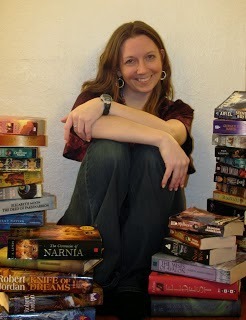
In her younger days, Nicole Singer snuck out of bed far too often to read by the glow of her nightlight. Not much has changed in 20 years, except she’s learned to keep the light on and her late nights now consist of reading AND writing. She writes fantasy and is currently working on a space-opera series, as well as outlines for a middle grade fantasy, YA steampunk and a historical fantasy. Her short stories have appeared in Soundings Review, Running in the Dark and the e-anthology Overcoming Adversity. As a public relations counselor, she also has written and edited articles for a variety of publications and assisted with promotions for three nonfiction book launches.
http://nicole-singer.blogspot.com/

Artemis Grey was raised on fairy tales and the folklore of Appalachia. She can often be found writing by a crackling fire or romping through the woods on horseback. It is her hope to make readers look at the world they’ve always seen, and see the world they’ve always envisioned. She has had five poems published in Poetry Pact 2011 (Volume 1) and several short stories in the online magazine Underneath The Juniper Tree.
http://greyplaces.blogspot.com/
What does your writing process look like?
"My Writing Process Blog Tour."
Yay me! *wink*

The blog tour includes wonderful authors who explain their writing processes. So be sure to check out the blog link above and the three below. And in the meantime, I will attempt to explain my own process. YIKES.
The questions:
1) What am I working on?
I'm currently working on two projects ... at the same time ... which is nuts. In the past I've only worked on one project at a time, but when I tried to decide what story to write next, there were two ideas that just would not leave me alone. And as a result, I'm working on them at a parallel pace. And no, I won't give you a description, yet. For now they are both my little secrets, but I will tell you that they are thrillers for the young adult market.
2) How does my work differ from others of its genre? This is a tough question to answer, but first let me say that my genre is: THRILLERS for the young adult reader. I'm not certain how my work differs, but I can tell you that my female main characters are strong young women who make a few bad decisions and then they save themselves. No Prince Charming rides in on a horse to save them. They got themselves into the mess, and they will get themselves out of it. :) Of course, there is a little romance in each of my books, but it's not the main focus, and the girls don't need the guys to save them (even though it really seems like there's no other possible way at some points during the stories).
3) Why do I write what I do? I am a huge fan of Dean Koontz, and while some of his books are unpredictably HORROR based, he is also an amazing writer of thrillers. I want to bring exciting thrillers to young adult readers ... the kind of books that you can't put down because you just have to know what is going to happen next.
4) How does my writing process work?
1. I read as many award winning and best-selling books as I possibly can.
2. I read books on the craft of novel writing, and especially before I begin writing a new story, I read a NEW book on the craft that I've not read before. This really helps refresh my brain on the skills and techniques involved in great writing. Usually while I'm reading, my brain will spark with character and plot ideas for my next manuscript.
3. I write a query letter, or an elevator pitch, or a quick summary ... BEFORE I write the story. I have found that this makes writing the manuscript easier. First of all, by writing out the pitch, I can make sure the idea is going to work and then stay on track. I even pass that pitch on to my beta readers and critique partners to get their feedback. It's amazing what kind of plot problems people can pick out just from your short pitch.
4. Once I've polished the idea, then I use Blake Snyder's Beat Sheet to rough out the main ideas of my plot. I'm mostly a "pantser" when it comes to writing, but I've found that by outlining the big ideas or main points of my story I can work out problems ahead of time and save effort later.
5. Character development exercises from books by James Frey and Donald Maass have helped me get to know my characters better before I start writing.
6. Then I jump in and write the first draft. I *try* to finish the first draft without revising and editing; otherwise (because I'm such a perfectionist) I would be stuck forever polishing the first chapter.
7. Revising is my favorite part. I start with the overall big ideas and work my way down to the small individual word choices. I believe every word needs to move the plot forward or develop a character. If the word, sentence, paragraph, scene, or chapter doesn't do one of these two things, then it either needs to be cut or seriously revised for improvement.
8. While I'm in the revision stage, I will send chapters off to my awesome critique partners. They lovingly rip my work to shreds, and then I revise it again. I prefer to stage my critique partners so that they are not reading the same version. I will usually send a chapter to one critique partner, revise as necessary, and then send it to another partner for new feedback.
9. Once I'm satisfied with the manuscript I will send it to a few beta readers who tend to look at the bigger overall story rather than nit-picky little details. I make necessary improvements based on their feedback.
10. I send the manuscript to my ROCK STAR agent. After she reads it, she sends me an editorial letter with suggestions for improvement. And I revise again (because her suggestions are always spot-on, and I always slap myself in the head and ask, why didn't I see that sooner?)
11. My agent submits my manuscript to editors at publishing houses. If the planets are aligned properly, it sells. Then the editor sends me a new editorial letter, and I revise again (slapping myself in the head again, asking, why did I not see that sooner?!)
12. And then I start the writing process all over again.
ha.
Want to read about other writers? Check out these awesome people. Visit and follow their blogs now, and then check back with them on March 28th when they'll feature a post about their writing processes:

Christi Corbett lives in a small town in Oregon with her husband and their twin children. The home’s location holds a special place in her writing life; it stands just six hundred feet from the original Applegate Trail and the view from her back door is a hill travelers looked upon years ago as they explored the Oregon Territory and beyond. http://christicorbett.wordpress.com

In her younger days, Nicole Singer snuck out of bed far too often to read by the glow of her nightlight. Not much has changed in 20 years, except she’s learned to keep the light on and her late nights now consist of reading AND writing. She writes fantasy and is currently working on a space-opera series, as well as outlines for a middle grade fantasy, YA steampunk and a historical fantasy. Her short stories have appeared in Soundings Review, Running in the Dark and the e-anthology Overcoming Adversity. As a public relations counselor, she also has written and edited articles for a variety of publications and assisted with promotions for three nonfiction book launches.
http://nicole-singer.blogspot.com/

Artemis Grey was raised on fairy tales and the folklore of Appalachia. She can often be found writing by a crackling fire or romping through the woods on horseback. It is her hope to make readers look at the world they’ve always seen, and see the world they’ve always envisioned. She has had five poems published in Poetry Pact 2011 (Volume 1) and several short stories in the online magazine Underneath The Juniper Tree.
http://greyplaces.blogspot.com/
What does your writing process look like?
Published on March 21, 2014 03:30
Cover Reveal for MY TETHERED SOUL by Dorothy Dreyer
YAY!
Here's the cover:
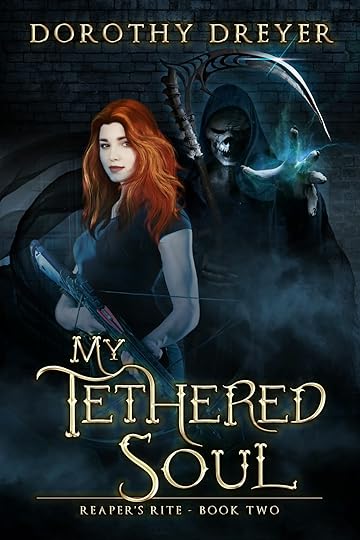
Synopsis
It’s been months since Zadie faced her sister’s Reaper, months during which she’s been under her mentor’s magical protection. But now that she’s turning seventeen, that protection is about to run out.
When dark forces lure Zadie to wander at night, she’s manipulated into committing unspeakable acts. With her friends and family at risk, Zadie must try to use her powers to break free from the Reaper’s grasp, or surrender to the Reaper’s Rite, which can only lead to death.
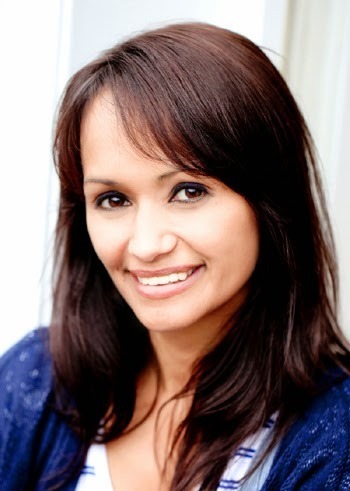
Author Bio
Dorothy Dreyer has always believed in magic. Born in Angeles City, Philippines, to a Filipino mother and American Father, Dorothy grew up a military brat, living in Massachusetts, South Dakota, Guam, New Jersey, and New York. She now lives in Frankfurt, Germany, with her husband, two teens, and two Siberian huskies. Dorothy not only writes books with some element of magic in them, but has a fondness for reading those kinds of books as well. She also enjoys movies, chocolate, take-out, and spending time with family and friends. She’s known to make a pretty sweet cupcake when she has the time. She also tends to sing sometimes, so keep her away from your Karaoke bars.
My Tethered Soul on Goodreads: https://www.goodreads.com/book/show/20703626-my-tethered-soul
Dorothy's Website: http://dorothydreyer.comDorothy's Twitter: http://twitter.com
Dorothy's Facebook Fanpage: http://facebook.com/AuthorDorothyDreyer
--
Dorothy Dreyer is an author of young adult books. Her debut, MY SISTER'S REAPER, released June 18, 2013, from Month9Books. MY TETHERED SOUL releases June 2014.
Here's the cover:

Synopsis
It’s been months since Zadie faced her sister’s Reaper, months during which she’s been under her mentor’s magical protection. But now that she’s turning seventeen, that protection is about to run out.
When dark forces lure Zadie to wander at night, she’s manipulated into committing unspeakable acts. With her friends and family at risk, Zadie must try to use her powers to break free from the Reaper’s grasp, or surrender to the Reaper’s Rite, which can only lead to death.

Author Bio
Dorothy Dreyer has always believed in magic. Born in Angeles City, Philippines, to a Filipino mother and American Father, Dorothy grew up a military brat, living in Massachusetts, South Dakota, Guam, New Jersey, and New York. She now lives in Frankfurt, Germany, with her husband, two teens, and two Siberian huskies. Dorothy not only writes books with some element of magic in them, but has a fondness for reading those kinds of books as well. She also enjoys movies, chocolate, take-out, and spending time with family and friends. She’s known to make a pretty sweet cupcake when she has the time. She also tends to sing sometimes, so keep her away from your Karaoke bars.
My Tethered Soul on Goodreads: https://www.goodreads.com/book/show/20703626-my-tethered-soul
Dorothy's Website: http://dorothydreyer.comDorothy's Twitter: http://twitter.com
Dorothy's Facebook Fanpage: http://facebook.com/AuthorDorothyDreyer
--
Dorothy Dreyer is an author of young adult books. Her debut, MY SISTER'S REAPER, released June 18, 2013, from Month9Books. MY TETHERED SOUL releases June 2014.
Published on March 21, 2014 02:00
March 19, 2014
Writer's Conference: Queries & First Two Pages
[Reposted from 2010 - but the tips are still great!]
Friday, I attended two of Suzie Townsend's (from Fine Print Literary) classes, and I gained insight and ideas from each of them. Loved them.
First, she offered a Workshop Class on how to make your first two pages really stand out from the slush. Here are my notes:
As soon as possible:
1. Establish your character and voice
2. Establish the conflict and move the story forward
3. Establish the tone
4. Establish an indication of setting
5. Catch the reader off guard - to grab them and keep them reading
Goals of first two pages:
1. Create interest in the character and the plot
2. Create intrigue
3. Create investment
Anticipate the pauses when someone is reading and make these your paragraph breaks.
Then she read many pages from participant and critiqued them. Imagine American Idol. (But Suzie is SUPER NICE, unlike Simon.) That was very productive.
Her second class featured strategies for writing a great query letter.
1. Main character
2. What happens to her
3. What choices does she make
4. What terrible thing will happen because of choices
The mc must decide whether to ________. If she does then ___________. If she does not then __________.
Sound stark not verbose. Make your point and then stop talking.
Every three lines, skip a line. This makes it easier to read in an email.
At the end of the class, Suzie went through each of our queries and offered significant feedback.
I was really impressed with Suzie, her skills, and her knowledge. If you're looking for a fabulous agent, I would highly recommend her. Check her out here: http://fineprintlit.com/about-the-agents/suzie-townsend/ [updated link for Suzie: Suzie's Blog]
Friday, I attended two of Suzie Townsend's (from Fine Print Literary) classes, and I gained insight and ideas from each of them. Loved them.
First, she offered a Workshop Class on how to make your first two pages really stand out from the slush. Here are my notes:
As soon as possible:
1. Establish your character and voice
2. Establish the conflict and move the story forward
3. Establish the tone
4. Establish an indication of setting
5. Catch the reader off guard - to grab them and keep them reading
Goals of first two pages:
1. Create interest in the character and the plot
2. Create intrigue
3. Create investment
Anticipate the pauses when someone is reading and make these your paragraph breaks.
Then she read many pages from participant and critiqued them. Imagine American Idol. (But Suzie is SUPER NICE, unlike Simon.) That was very productive.
Her second class featured strategies for writing a great query letter.
1. Main character
2. What happens to her
3. What choices does she make
4. What terrible thing will happen because of choices
The mc must decide whether to ________. If she does then ___________. If she does not then __________.
Sound stark not verbose. Make your point and then stop talking.
Every three lines, skip a line. This makes it easier to read in an email.
At the end of the class, Suzie went through each of our queries and offered significant feedback.
I was really impressed with Suzie, her skills, and her knowledge. If you're looking for a fabulous agent, I would highly recommend her. Check her out here: http://fineprintlit.com/about-the-agents/suzie-townsend/ [updated link for Suzie: Suzie's Blog]
Published on March 19, 2014 14:13
March 17, 2014
Need Writing Motivation?
Published on March 17, 2014 20:44
March 14, 2014
Book Review: THE FAULT IN OUR STARS
 The Fault in Our Stars by John Green
The Fault in Our Stars by John GreenMy rating: 5 of 5 stars
I've read three books now by John Green, and this was the best one (and I really enjoyed the others).
This is a great story about the walls we put up to protect ourselves ... and sometimes we think we are protecting the people around us as well by creating the walls. However, love, honesty, trust, and faith ... these are the best gifts we can give ourselves and those around us. The joy of love far outweighs the safety of enclosures.
This is a fantastic YA book. There's a little profanity and a small sex scene. Neither are overdone.
It's a great book to read and discuss as a family.
I highly recommend this book, and I'm very much looking forward to the movie!
View all my reviews
Published on March 14, 2014 03:00




